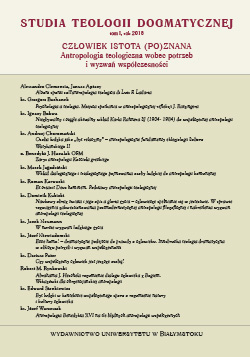Ecce homo! – dramatyczne podejście do prawdy o człowieku. Innsbrucka teologia dramatyczna w obliczu potrzeb i wyzwań współczesności
Ecce homo: Dramatic Approach to the Truth about Man. Innsbruck Dramatic Theology Facing the Needs and Challenges of the Present
Author(s): Józef NiewiadomskiSubject(s): Philosophy, Theology and Religion
Published by: Wydawnictwo Uniwersytetu w Białymstoku
Keywords: Raymund Schwager; René Girard; dramatic theology; original sin; cross; redemption; scapegoat; sacrifice; (mimetic) desire; evolution; ciolence
Summary/Abstract: Pilate’s words “Behold the man” are a good starting point for the dramatic dispute about the truth of humankind. In no way does beholding the tortured victim elicit compassion; rather it increases the mob’s lust for persecution. Although Jesus’ persecution is akin to the persecution of countless scapegoats throughout human history, his dying is unique. He is in a radical way nonviolent in his dying and free from any wish for revenge. Thus, Christ dies in an act of solidarity with all victims of human history; still his dying is different from theirs. Therefore this death deconstructs the sacrificial order, founded by the murder of a scapegoat; his death reveals the non violent image of God and the image of a man, who is able to give up himself for others (Proexistenz/ sacricium) The founder of Innsbruck Dramatic Theology, Raymund Schwager, therefore viewed Christ’s cross both as a source of new anthropological insights and as a source of life. As a homo perfectus (GS 22) Christ unites himself with all human persons by identifying with all victims of human history and by asking the Father in their place for forgiveness for the perpetrators. These fundamental soteriological positions will be examined in this article for their anthropological consequences. In connection with René Girard’s mimetic theory, theological anthropology is being anchored in an evolutionary world-view and the classical questions about the creation of humanity by God and about original sin are interpreted in a new light. A mimetic conception of human desire stands at the center of this endeavor. The question of a normative anthropology is approached in the context of Christology and Soteriology and is analyzed in the context of the theme pro-existence/sacrifice. The article reflects the general viability of dramatic categories for present-day theological thinking in the face of an intensifying scapegoat-mentality.
Journal: Studia Teologii Dogmatycznej
- Issue Year: 2015
- Issue No: 1
- Page Range: 185-207
- Page Count: 23
- Language: Polish

